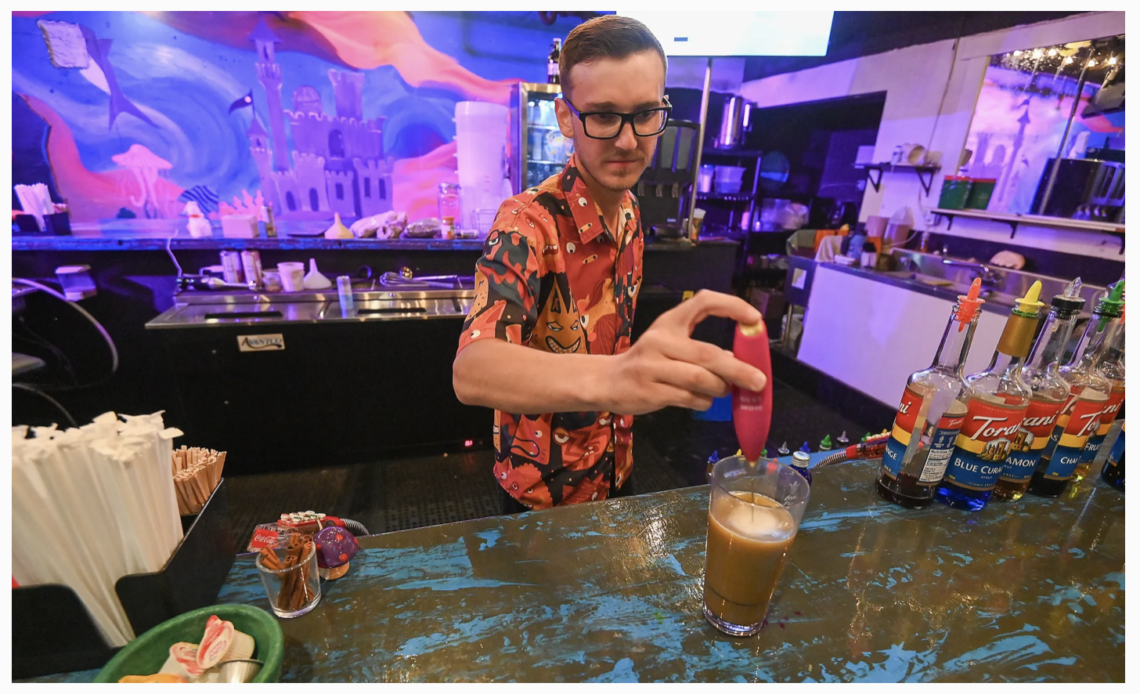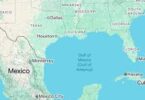Weld County’s first kava business is up and running with a new model after local health officials determined it was in violation of federal regulations back in June.
Despite a temporary closure and a complete reformatting of his business, owner Evan Elder hopes to help people down a path to sobriety by providing healthy, safe alternatives to alcohol with kava.
Last year, Elder opened the Bula Basement, A Kava Klub, at 807 17th St., Unit H in Greeley. A sober bar open to those 18 and older, the Bula Basement sells drinks containing kava, a root from a pepper plant from the South Pacific islands.
In those regions, kava is grown for its relaxing and healing effects as a pain reliever, muscle relaxant, and as a remedy for anxiety, nervousness and insomnia, according to the National Library of Medicine. For small doses of kava, common effects include relaxed muscles, sleepiness, feelings of well-being and relaxation, mild loss of feeling in the throat and mouth and appetite loss, the Better Health Channel reported. Effects from larger dosages include dilated pupils, reddened eyes, nausea, drowsiness and reduced muscle control.
Strong data has shown that kava can treat or minimize anxiety among users, according to Monika Nuffer, a clinical pharmacist, herbalist specialist and aromatherapist at UCHealth Integrative Medicine Center in Denver. However, Nuffer said no dietary supplements, herbal vitamins or minerals are 100% safe.
In June, the Weld Health Department found Elder was not properly serving kava in accordance with Food and Drug Administration regulations.
Gabri Vergara, consumer protection manager for the Weld County Department of Public Health and Environment, conducted a review of the Bula Basement. Elder shared with the health department that he was making the kava himself in bulk — taking the kava plant, grinding it down, squeezing the liquid out and then adding that into a beverage.
Because the product wasn’t premade, the way he crafted the kava was classified as processing a food additive, which requires another type of licensing, Vergara said. As a result, the product was required to be consumed individually because the FDA doesn’t recognize kava as a food additive but as a health supplement, Vergara said.
Individual consumption entails employees serving customers kava in an individually sealed packet of kava, processed by an FDA-approved source. In Colorado, this consumption approach is the route all retail food establishments take to legally sell kava, according to Vergara.
“That’s the line that the FDA draws … if it’s not generally recognized as safe, then it cannot be added into food,” Vergara said. “The way he was doing the kava was not acceptable. It’s not allowed in a retail food establishment.”
The Bula Basement temporarily closed in June, a decision made by Elder himself. He has since worked with the health department to reopen on July 14 with solutions to further his kava sales.
Elder has since introduced new prepackaged products, including a plant-based herbal supplement called “Feel Free” that contains kava. The product is manufactured in an FDA-regulated facility, but it’s not intended to “diagnose, treat, mitigate, cure or prevent any disease or illness,” according to the product’s website.
Elder also brought in two other brands of plant-based alcohol alternatives with mushroom extracts that claim to boost mood, energy and cognition.

Although these changes brought financial struggles to Elder, he said the return of students means the business is already “breaking even.”
Elder is throwing a back-to-school party on Friday with several performers from 8 p.m. to 1 a.m.
Elder said he’s excited to see what the future holds for the Bula Basement.
Concerns about kava’s impacts
Better Health Channel reported that many of the health concerns related to kava are related to long-term use, including problems such as breathing difficulties, liver damage, kidney damage, worsened symptoms of pre-existing mental illnesses, compromised immune function and more.
Regardless of the delivery, Nuffer confirmed kava does come with the risk of worsening a person’s liver, or hepatotoxicity.
Because of that risk, Canada and Europe banned kava in the early 2000s after recording more than 100 cases of liver failure and death, she said. The cases of liver failure weren’t just at high doses; normal doses also led to health concerns.
Nuffer said the United States has never banned kava, but there are warnings for consumers and health care practitioners.
The risks are especially elevated among people who already have liver dysfunction or failure. Nuffer said there are also concerns for people who are pregnant or breastfeeding because kava can go through breast milk and affect the fetus.
Kava may not be safe for people on other medications or supplements, as well, because it might be unsafe to combine them. Nuffer cited taking kava with alcohol as an example because it amplifies its effects, but it may lead to liver failure.
Since kava can provide feelings of relaxation, taking it with alcohol or other prescriptions may increase sedation, which can cause risks for driving, operating heavy machinery and more.
Many prescription labels warn about drinking alcohol while taking the prescription, but that isn’t the case with many health supplements because they aren’t regulated.
“Just because it’s natural doesn’t mean it’s safe,” Nuffer said. “As a pharmacist or an herbalist, I always think about the safety and efficacy. Does it work for what you want to use it for? Is it safe? Is it safe for everyone? And if it’s not safe, what are the things we need to look out for?”
Elder encourages consuming kava without other substances, banning alcohol and drugs from entering his bar to provide focus on sobriety.
Addiction recovery
Elder said his own experience with kava drives his determination to educate people about its lifesaving benefits. Once struggling with addiction himself, Elder used kava to quit drinking alcohol.
He explained kava attaches stably to GABA receptors, creating similar feelings of intoxication without the instability of alcohol and drugs — which can take users from the best night of their life to feeling extremely distraught in a few seconds.
“With kava, I’m not going to promise that you’re going to have the best night of your life, but I can promise you that you’re not going to have the worst time of your life just because those happy receptors are stable and engaged,” Elder said.
At this time, United States studies have not shown kava is effective for addiction recovery, according to Nuffer. However, she said the data doesn’t mean people won’t have specific benefits, such as what Elder attested to. There are many factors that go into kava’s effects, working for some people and not affecting others.
Studies have shown kava is effective for minimizing anxiety, Nuffer said. Even at high doses, she said, there aren’t any negative effects on cognition or mental health.
But manufacturing certain botanicals, such as kava, needs to be standardized. Standardization includes potency levels — how much do I need to get the amount that is effective?
To see positive outcomes for minimizing anxiety with kava, the product needs a concentration of about 70% kavalactones, which are the main active ingredients in kava as a class of lactone compounds found in kava root, Nuffer explained. For reference, the kava root’s natural concentration ranges from 3% to 20%; the dry root is 10%; and the dry kava is 3.5%.
“So are you wanting to treat anxiety, or do you just want to have a nice time? Nuffer asked. “That dose may also vary.”

The Bula Basement’s products aim to wane people off of unstable substances through sobriety and science, Elder said. He is motivated to begin reaching out to county and city leaders to help with Greeley’s pain problem and share his solutions with kava products.
“The way that they’re solving that pain problem is with drugs and alcohol,” Elder said. “Now, if Greeley can solve that pain problem with love, sobriety and science, that would be so much better. And that’s what I’m here to show them.”







